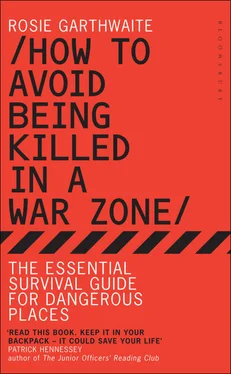‘I had no books or papers for many years, so had to keep myself alive mentally. Do not allow yourself to be over-depressed by the situation. Use it as an opportunity to explore your inner self and to use your imagination in a creative manner by writing in your head or composing music if you have that ability.
‘I was chained by the hands and feet, but managed to do regular exercise, like what you can do when confined to an airline seat for many hours. It is important to keep your health as best you can.
‘Don’t demean yourself by pleading with your captors, and don’t say any more than you have to. There is no need to be aggressive, and it’s pointless, as it will get you nowhere.
‘Keep hope alive. Remember that most hostages are released eventually. There is much, much more that I could say, but that is enough for the moment. Let’s hope you never need the tips that I have given.
‘Happy travelling!’
/ADVICE FROM OTHER KIDNAP EXPERTS
Sue Williams works at the very top of the mysterious business of hostage negotiation. She has been involved in hundreds of kidnap incidents, and not all of them have ended happily. She says there are two things to remember if you are ever taken hostage:
1.Do everything within your power to maximize your chances of survival.
2.Don’t underestimate the outside influences working tirelessly on your behalf.
/HOW TO MAXIMIZE YOUR CHANCES OF SURVIVAL
The information here is all about staying strong and able despite the strains that kidnapping will be having on you mentally and physically.
Sue Williams advises: ‘During the extended periods of boredom and increasing feelings of hopelessness, it is crucial to remain focused. A daily routine can provide structure to an otherwise vacuous day. If exercise forms part of this programme, improvement may occur physically and that achievement can also improve your state of mind.’
Chapter 10 is devoted to exercises that you can do in the confined space of a hotel room in a war zone, but they can also be done in the average prison cell. The importance of physical fitness, and its effect on your mental stability and levels of stress, cannot be overstated. It will also help you to sleep away the long hours.
Your captors might use food as a bargaining chip for good behaviour or information. On the other hand, starving you could be their chosen means of torture. But remember, a dead hostage is worth little to your kidnappers. You too can use food to your advantage, but use it to build ties rather than break them. According to Sue Williams, the trade-off for refusing food is not worth it. ‘All offers of food should be accepted, not only due to its scarcity, but also to avoid offence, increase bonding and encourage rapport during mealtimes.’
But James Brandon, the hostage and friend I introduced you to at the beginning of this chapter, offers a word of caution: ‘If your kidnappers give you food or water, it can seem like generosity. It isn’t. Your kidnappers are feeding you because you are more valuable to them alive than dead, not because they like you.’
Another way to maximize your chances of surviving is to make your incarceration about more than just survival. Sue Williams advises trying to build as much of your normal life into your caged world as you can: ‘Do not be afraid of asking for things, particularly medicines, reading material and items that will assist in maintaining personal hygiene. Remember, it is in the kidnappers’ interest for you to remain alive and in good health.’
Note that the more human you are, the easier it will be to build those key bonds with your kidnappers. James Brandon told me: ‘If you get kidnapped, you must get your kidnappers to empathize with you. My kidnappers accused me of being a soldier and a member of the CIA. In an effort to make me “confess”, they alternated mock executions with punching me in the head. After hours of this they stopped and one of them offered me a cigarette. I don’t smoke, but I took one anyway, hoping it would in some way break the ice. As I smoked it down to the butt, still blindfolded, a kidnapper reached down and gently took the smoking cigarette from my fingers before I burnt myself. In a small way it seemed like progress. A man who had been willing to kill me was now stopping me from giving myself a cigarette burn. He was being forced to recognize my humanity.’
Jacky Rowland, a reporter based in Jerusalem, has a simple tip: ‘Always carry a photograph of you with your children. Or with someone else’s children. When push comes to shove, if you can connect with your captors or kidnappers on a human level (everyone loves their kids), it might just save your life.’
Finally, no matter how isolated you feel, never forget that people in the outside world are working on your behalf. Sue Williams advises: ‘Hostages should never underestimate the wealth of activity being undertaken by those on the outside who are trying to ensure a speedy and safe release. It is easy for hostages to believe they have been forgotten and that nobody cares about their plight, but that couldn’t be further from the truth.’
/WHAT HOSTAGES SHOULDN’T DO
Everyone I have consulted agrees that there are no absolutes when it comes to kidnapping situations, but many concur with the following:
Don’t be a hero.Accept your position as a prisoner and behave like one. Any attempt to show authority or rebel will result in the kidnappers picking you out from the group. If you are alone, ‘stroppiness’ might distinguish you as annoying, possibly easier to kill than the last person they held captive.
Do not make any threats or promisesbased on your position in the outside world. You are no longer that person. You are now a hostage with a certain value. You have no authority any more. Claiming that you do will alter the kidnappers’ perception of you and might have bad consequences.
Don’t escape unless you are certain that you can.Getting caught will simply put you or others in danger. Work out what you are gambling.
Not everyone agrees with that advice. James Brandon told me: ‘I decided early on I would rather escape than wait for my kidnappers to decide what they wanted to do with me. I would rather die in an escape attempt than be slaughtered like a sheep with my final moments immortalized forever on YouTube.’
Do not let on that you know your kidnappers.If they are trying to hide their identity but you recognize them anyway, play along with their disguise.
Do not sustain eye contact with your kidnappers.Many people find this threatening.
Don’t get too frustrated with deliberate attempts to confuse you.Keep to a routine to orientate yourself in place and time.
Do not behave aggressively.It will make it harder for the kidnappers to empathize with you.
Do not try to form genuine friendships with your captors.It might result in them exploiting you. It is also the road to Stockholm syndrome, where a hostage falls in love with and eventually aids their kidnapper.
/GOVERNMENTS DO NEGOTIATE
The resolution of almost all kidnappings involves an exchange of money. If kidnap negotiation were a science rather than a delicate art, your price or political value would be determined as shown on the following graph:

The initial price demanded by a group of kidnappers is likely to be unacceptable to the government, company or family negotiating for the hostage. The negotiators therefore have to weigh the risk of your being killed against the figure they think the kidnappers will accept for a ransom. It is a delicate balance because the price must also be high enough for the kidnappers to take the risk of returning you.
Читать дальше





![Джонатан Димблби - Barbarossa - How Hitler Lost the War [calibre]](/books/385421/dzhonatan-dimblbi-barbarossa-how-hitler-lost-the-w-thumb.webp)







